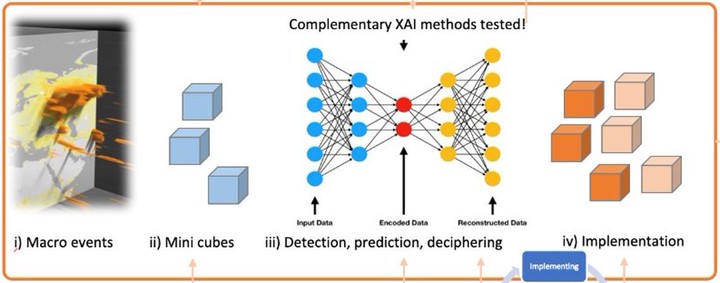DeepExtremes

About
Climate extremes are on the rise, which is one of the most critical manifestations of climate change. Compound events can drive a combination of spatial and/or temporal hazards, and the instantaneous effect and long-term impact on society and the environment are typically much higher than a single event on its own. However, the multi-dimensional nature of compound events leads to a series of methodological challenges.
The Deep-Extremes project aims at
- Focusing on compound heat and drought events on a global scale, detecting based on long-term climate and land-surface data, combining EO archives and other observation data, with methods tailored to multivariate event detection.
- Sampling a subset of large events in the Sentinel era and zooming into the events and in unaffected areas around the event with high-dimensional “mini-cubes”.
- Training complementary deep-learning methods for prediction and understanding dynamics in such events.
- Implementing the tested and validated workflow in a cloud environment and developing it further based on community feedback.
- Engaging with the community via workshops and science discussions to further develop the proposed framework.
The project is funded by the European Space Agency (ESA), part of the AI4SCIENCE activity. The first AI4SCIENCE ITT focuses on Extreme Events, Multi-Hazards and Compound Events, and contributes to the ESA Extremes and Natural Disasters Science Cluster. See Project page on ESA-EO4Society here.
Data
- ERA5 Temperature data
- SPEI data
- Sentinel-2
Team
- Miguel Mahecha (Leipzig University, Germany)
- Chaonan Ji (Leipzig University, Germany)
- Karin Mora (Leipzig University, Germany)
- Guido Kraemer (Leipzig University, Germany)
- Gunnar Brandt (Brockmann Consult GmbH, Germany)
- Carsten Brockmann (Brockmann Consult GmbH, Germany)
- Tonio Fincke (Brockmann Consult GmbH, Germany)
- Norman Fomferra (Brockmann Consult GmbH, Germany)
- Gustau Camps-Valls (University of Valencia, Spain)
- Miguel-Ángel Fernández-Torres (University of Valencia, Spain)
- Oscar José Pellicer Valero (University of Valencia, Spain)
- Gonzalo Mateo García (University of Valencia, Spain)
- Luis Gómez-Chova (University of Valencia, Spain)
- Eva Sevillano Marco (University of Valencia, Spain)
- Maria Gonzalez Calabuig (University of Valencia, Spain)
- Fabian Gans (Max-Planck-Institute for Biogeochemistry, Germany)
- Mélanie Weynants (Max-Planck-Institute for Biogeochemistry, Germany)
- Christian Requena-Mesa (Max-Planck-Institute for Biogeochemistry, Germany)
- Vitus Benson (Max-Planck-Institute for Biogeochemistry, Germany)
News and Events
- 2022.02.11 Kick-off meeting
- 2022.03.01 Event definition meeting
- 2022.05.10 Methodical follow-up meeting
- 2022.06.07 Bi-weekly technical meeting
- 2022.06.08 XAIDA-DeepExtremes-Interaction regional meeting
- 2022.07.19 Bi-weekly technical meeting: preparation for D1, D2 and D10
- 2022.08.16 Bi-weekly technical meeting: event detection process
- 2022.08.24 Excursion to the Hainich forest
- 2022.08.30 Bi-weekly technical meeting: sampling strategy
- 2022.09.13 Bi-weekly technical meeting: preparation for PR meeting
- 2022.09.27 Bi-weekly technical meeting: exchange, preparation for PR meeting and D3
- 2022.09.30 Project review meeting